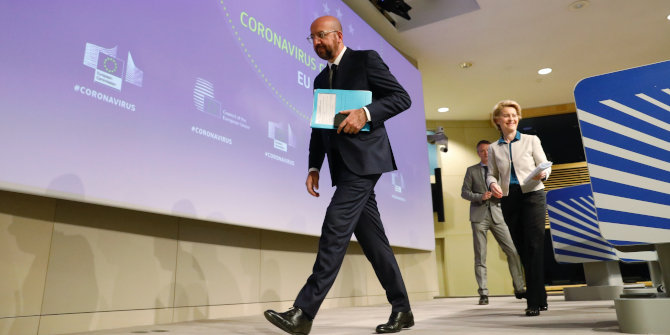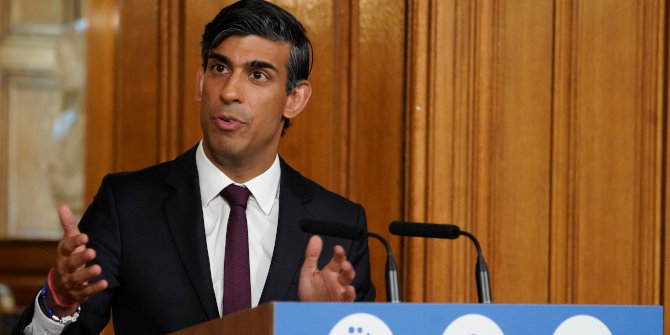
 In the Covid-19 crisis, Europe is paying a high price for diversity, write Alessio Pacces and Maria Weimer. The failure to coordinate national public health responses in the initial stage of the outbreak has undermined both the fight to save lives and core European values and principles. But the fight against Covid-19 is a marathon, not a sprint. Going forward, Europe’s survival will depend on how it handles the exit from this crisis. The Commission has published a European Roadmap for lifting Covid-19 measures – member states must follow its recommendations before it is too late.
In the Covid-19 crisis, Europe is paying a high price for diversity, write Alessio Pacces and Maria Weimer. The failure to coordinate national public health responses in the initial stage of the outbreak has undermined both the fight to save lives and core European values and principles. But the fight against Covid-19 is a marathon, not a sprint. Going forward, Europe’s survival will depend on how it handles the exit from this crisis. The Commission has published a European Roadmap for lifting Covid-19 measures – member states must follow its recommendations before it is too late.
There is a paradox at the heart of the European fight against Covid-19. Challenges of this kind are why we have the EU in the first place: to enable effective collective action in the face of transboundary problems that no member states can address on their own. Yet, in the current situation national governments are calling the shots and making the EU look incredibly weak. Member states’ divergent responses to this crisis reveal a lack of unity in the face of a humanitarian catastrophe. At worst, they risk breaking up the Union altogether.
There are in principle good reasons for such diversity, which have to do with limited EU competences. Health policy is a national competence and the EU only supports national crisis management. This reflects the need to respect the sheer complexity of how national health systems are organised. Different national approaches are rooted in national culture and history, as well as in national federal structures (e.g. in Germany or Italy, public health is a matter of sub-federal entities). National governments are best placed to assess the availability of resources, critical infrastructures, and the expected behaviour of citizens in a crisis. After all, trust in doctors and governments is shaped by cultural attitudes and is a factor in determining the effectiveness of emergency measures, such as social distancing and lockdowns. It is therefore not surprising that member states have adopted different responses to Covid-19. They carry the political responsibility for their crisis management vis-à-vis their citizens.

Charles Michel, President of the European Council, with Ursula von der Leyen, President of the European Commission, on 15 April 2020, Credit: European Union
It is clear then that divergent national responses to Covid-19 cannot be fully avoided. Yet, they can and must be better coordinated. Without effective coordination, there is a steep price to pay for diversity. This is where the EU should play the role it is destined to play. The EU offers invaluable tools for coordination and support in situations of public health emergencies. If used effectively by the member states, these tools can foster mutual learning and solidarity, which are currently much needed, while respecting national diversity. How well this potential is realised depends on the political will of national governments. Unfortunately, at the moment, governments seem to be thinking about short-term political gains rather than the medium- and long-term common European interest. Let’s look at these arguments in turn.
The price of diversity is that decentralised policymaking on Covid-19 produces damaging spillovers. For national containment strategies to be effective, border restrictions between countries with different Covid-19 strategies must be introduced. As a result, for several weeks now, we have been experiencing what it means to have borders again in Europe. Even worse, border checks and restrictions are here to stay for some time because when measures are lifted in some countries, they will still be in place in some others, and this dissonance might be repeated in several rounds as part of any gradual exit strategy until the vaccine is found. The resulting suspension of the free movement of persons is likely to undermine everyone’s sense of belonging to the EU. It also reduces interstate labour mobility, which combined with restrictions of the free movement of goods increases the likelihood of Covid-19 causing a global supply shock.
In fact, different national Covid-19 measures also disrupt supply chains. Compared to a ‘normal’ recession, where a lack of demand is the problem, Covid-19 causes supply problems. Economic output will fall because some production must be halted or reduced to prevent excessive contagion. Inputs, such as equipment and labour that are incompatible with social distancing, get scarcer and reduce the supply of certain goods. This is already affecting countries differently, depending on their specialisation and openness to trade, but the differences will be exacerbated by the different timing of containment and exit policies.
Countries in lockdown must cope with a shortage of goods and impose shortages on others, not only because of underproduction but also due to hoarding, export bans, and other restrictions. This is particularly alarming with regard to scarce yet urgently needed medical equipment, the free movement of which member states have already tried to restrict. We expect an increase of such protectionist reactions as more goods become scarce as the virus spreads. This reflects a more general problem: asymmetric Covid-19 policies create conflicting interests which, in turn, undermine cooperation between states.
This is why coordination at the EU level is so important. After the initial mistakes and weak cooperation with regard to putting containment measures in place, it is now high time to follow a coordinated European approach to the exit strategy. Testing the wider population to determine contagion and immunity is key to any such exit strategy. On the one hand, creating a safe space to work, in which people are either immune or not infected (and distanced from anyone who could be), is crucial to restarting economies after the contagion is under control, without risking a second peak of the outbreak. On the other hand, having an EU approach to labour mobility and physical production could overcome the current and foreseeable restrictions to the free movement of persons and goods: for instance, workers from different member states could participate in EU ‘green zones’, free of contagion, and produce scarce goods. Solutions of this kind would complement national approaches to the exit strategy, but also promote more solidarity between member states.
The EU offers important tools for coordination. Several EU agencies and expert bodies (the European Centre for Disease Prevention and Control, the Covid19 advisory panel, the Joint Research Centre) coordinate scientific advice at the international and national level and prepare guidelines for containment, testing, and surveillance of the virus. This scientific advice is regularly discussed between the Commission and member states in the so-called EU Health Security Committee, which is a crucial form of information exchange and decision-making. The EU is also organising joint procurement of tests and other medical equipment.
With regard to exit, the Commission published a roadmap for a coordinated EU exit strategy on 15 April. Member states initially resisted the publication of this document. Some, such as Austria and Denmark, announced unilateral plans to relax Covid-19 lockdowns, which differed from the plans of other EU countries. The insistence of the Commission addresses our key concern: the longer the EU waits, the less room there will be for coordination. This could result in long-lasting damage to free movement and EU solidarity. Public health protection is equally at risk if national lockdowns are relaxed too quickly, particularly if this is based on political opportunism or economic lobbying rather than commonly agreed science-based criteria. Differently from the former, the latter take the still pervasive scientific uncertainty surrounding the virus into account.
The initiative of the Commission addresses these concerns. It is a commendable first step towards delineating a common European framework on how to gradually lift confinement measures, based on common principles of scientific advice, coordination and solidarity. At the same time, however, the roadmap still leaves ample margins for member states to continue restrictions of free movement in the presence of asymmetric situations and policies. More EU leadership seems to be in order, particularly on the collection of epidemiological data and the design and mutual recognition of testing and tracing policies.
The fight against Covid-19 is a marathon, not a sprint. Europe’s survival will depend on how it handles the exit from this crisis. We noted the challenge stemming from different health policies in the EU. While this difference reflects national preferences and political legitimacy, it has produced damaging spillovers between member states. We propose to turn this challenge into an opportunity.
The EU has now indicated a European exit strategy from asymmetric, albeit gradually converging, containment policies in relation to Covid-19. Such EU guidance, if followed, could improve mutual learning between member states, which have been exposed to the epidemic at different times and learned different lessons. So far, member states have delayed learning from each other and undermined cooperation. This must change before it is too late. The ball is now in the member states’ court. They must act in the common European interest and follow the Commission’s lead in order for Europe to resurrect united from the ashes of Covid-19.
For more information, see the authors’ recent paper at the European Journal of Risk Regulation
Please read our comments policy before commenting.
Note: This article gives the views of the authors, not the position of EUROPP – European Politics and Policy or the London School of Economics.
_________________________________
 Alessio Pacces – Amsterdam Center for Law and Economics
Alessio Pacces – Amsterdam Center for Law and Economics
Alessio Pacces is a Professor of Law and Finance at the Amsterdam Law School and the Amsterdam Business School, Amsterdam Center for Law and Economics.
–
 Maria Weimer – Amsterdam Center for Law and Economics
Maria Weimer – Amsterdam Center for Law and Economics
Maria Weimer is an Associate Professor of EU Law and Risk Regulation at the Amsterdam Law School, Amsterdam Centre for European Law and Governance, and author of the book “Risk Regulation in the Internal Market – Lessons from Agricultural Biotechnology” published with Oxford University Press in 2019.





